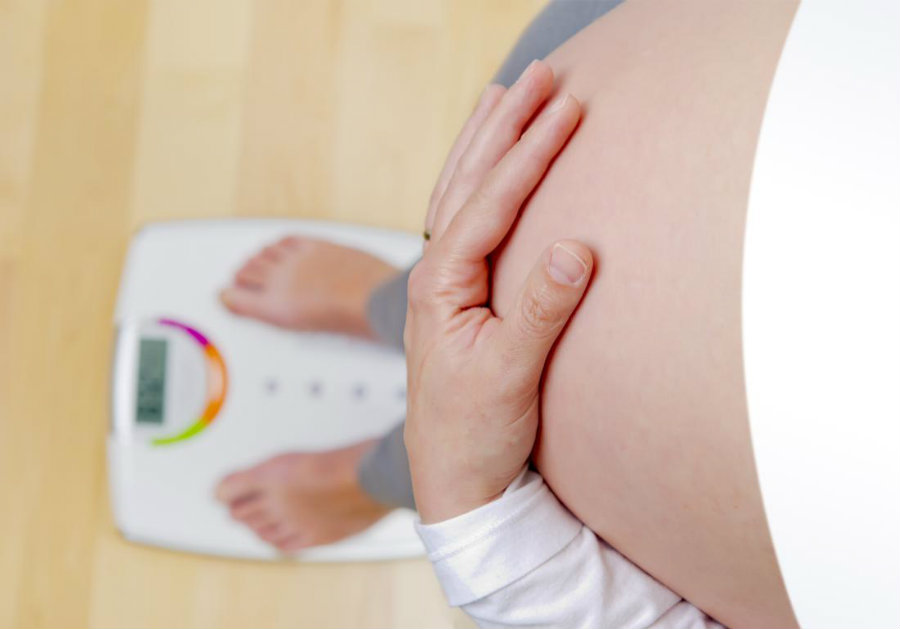According to a recent report from the U.S. Centers for Disease Control and Prevention, there was more than 50 percent of women in 2014 that were either overweight or obese at pregnancy. Researchers reported on August 5 that obesity and overweight problems could lead to severe conditions for both moms and babies.
In a new report published in the National Vital Statistics Reports, on August 5, researchers for Health Statistic at the U.S Centers for Disease Control and Prevention said that among American women who gave birth in 2014 more than half were heavier than normal before pregnancy.

Results showed that among women giving birth in 2014, 3.8 percent were underweight (with a Body Mass Index less than 18.5), and 45.9 percent were of average weight (whose BMI was 18.5–24.9). But it was found out that More than 25 percent were overweight, and 24.8 percent were obese before becoming pregnant.
47 states were included in the report, except Connecticut, New Jersey, and Rhode Island to portray the whole picture of what prepregnancy BMI values looks like in the United States.
“This report provides descriptive information on prepregnancy BMI for births in 47 states and D.C. (96% of all births) occurring in 2014 and shows that approximately one-half of women was overweight or had obesity prior to becoming pregnant. The birth certificate data can be used to fill a vital gap in describing and tracking BMI, specifically among childbearing women in the United States.” researchers reported.
The first report focused on BMI
Amy Branum, lead researcher and a statistician with the CDC’s National Center for Health Statistics, remarked that the new report is the first to focus on prepregnancy Body Mass Index (BMI). Nevertheless, Branum said that the results do not look as great as it should be.
BMI refers to a value derived from the mass (weight) and height of an individual. BMI measure tries to reckon the amount of tissue mass (muscle, fat, and bone) in an individual. Once those values are calculated the person is fit, depending on the case, into different categories: underweight, healthy weight, overweight, or obese.
Branum also said that the findings widely differ from the standard among all women in the U.S. population, and she added that increased prepregnancy overweight and obesity contribute to the obesity epidemic in the United States.
Researchers reported that women with Asian-American descent under 20 years old, women with a college degree, new mothers and women who paid for their delivery were the least likely to be overweight or obese before pregnancy.
In turn, Older women, aged more than 40 years, black, American Indian or Alaska Native were more likely to be obese before pregnancy. The team of researchers also found that this group was also less likely to have a college degree and more likely to rely on Medicaid (a U.S. social healthcare program for families and individuals with limited resources) to pay for their delivery.
Health implications of prepregnancy overweight
The survey’s findings concern researchers and the medical community due to the health implications of being obese and overweight during pregnancy.
Concerned with health implications of prepregnancy overweight, Dr. Siobhan Dolan, a medical adviser to the March of Dimes, said that they are very real and need to be seriously considered.
The March of Dimes is an American nonprofit organization that aims to improve the health of mothers and babies. Despite being founded by President Franklin D. Roosevelt, in 1938, to fight polio, it has been focused on the promotion of general health for pregnant women and babies.
As per Dr. Dolan, moms are at risk of suffering from high blood pressure and diabetes before and during pregnancy if they are obese or overweight. Such conditions are dangerous per se, but the pathology gets worse when they lead to problems such as early delivery and the need for a cesarean section. Doctors have mostly referred to the complications an early delivery and a cesarean represent for the mother and the infant.
Dolan recommended all women to visit a doctor before getting pregnant. A physician’s guidance before pregnancy could help women to pave the way for a healthier gestation for both: the baby and the mom.
Experts from the American Congress of Obstetricians and Gynecologists (ACOG) advised that losing weight before becoming pregnant is the best way to decrease the risk of problems caused by obesity. They have also stated that losing even a small amount of weight (5-7% of current weight, or about 10-20 pounds) can improve overall health in women before getting pregnant.
“(A prepregnancy control to lose weight could help to) become as healthy as you can prior to pregnancy. A lot of being healthy before pregnancy is prevention, and a healthy weight is part of prevention,” advised Dolan. She also counseled that women with conditions such as high blood pressure and diabetes must get under professional control before the start of pregnancy.
Source: CDC
